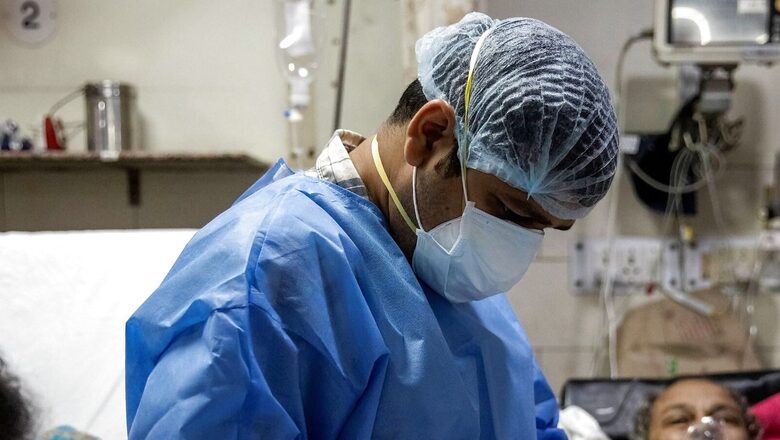
views
Cough, breathlessness, itchy eyes, and asthma attacks – as toxic smog envelops Delhi and the National Capital Region (NCR) with the air quality worsening, doctors are battling with emergencies in hospitals.
Health experts have noticed a surge in respiratory diseases and allergies accompanied by complaints of cough and breathlessness.
It is not a new phenomenon as the area around the national capital faces a severe pollution crisis every year around Diwali as with the onset of winter the concentration of ultra-fine PM2.5 particles multiplies manifold as people set off firecrackers and undertake stubble burning. PM2.5 particles are harmful heavy metals and toxic chemical compounds in the air.
“The number of patients coming to respiratory clinics with cough and breathlessness has increased tremendously in the last couple of weeks,” Dr Arjun Khanna, head of pulmonary medicine at Amrita Hospital, Faridabad, told News18.com.
A similar trend was echoed by other doctors as well.
“We are seeing patients coming to our OPD with symptoms of cough with sputum production, increased wheezing and breathlessness, running nose, blocked nose, itching in throat and eyes,” said Dr Avi Kumar, senior consultant, pulmonology, at Fortis Escorts in New Delhi.
Kumar said that the patients are coming to the emergency wing with increased exacerbation of asthma and chronic obstructive pulmonary disease (COPD) as well as increased risk of lung infections, and pneumonia.
Patients with pre-existing lung diseases such as COPD, asthma, interstitial lung disease, and severe post-Covid sequelae are at risk to face difficulties in air pollution, doctors warned.
Worsened air quality deeply affects the immune system and may impair the overall health of a person, experts cautioned. They believe that the impact of air pollution is not only limited to respiratory issues but may also cause other health problems such as insulin resistance or heart stroke.
Diabetes, stroke, eye infection and infertility
According to Dr Raj Kumar, consultant, of internal medicine at Indian Spinal Injuries Centre, Delhi, some studies confirm that exposure to pollution may also lead to insulin resistance which is a risk factor for diabetes.
“It is associated with the risk of stroke as well. Where pollution aggravates respiratory issues like asthma and COPD, the consistent respiratory issues may cause heart diseases as well,” he explained. “Several OPDs (other than the respiratory department) are also witnessing a rapid increase in the number of patients reporting such problems.”
In fact, ophthalmologists are also noticing an upward trend in the complaints of eye-related ailments with soaring air pollution.
“The eyes are too sensitive and prone to irritation from allergies, chemicals and pollutants in the air. In fact, high levels of pollutants and a rise in PM2.5 levels are leading to a number of eye conditions ranging from simple eye irritation to severe allergy,” said Dr Mahipal Sachdev, director, Centre for Sight Group of Hospitals.
He warned that some conditions can be severe as well. “Presence of SOx (sulphur oxides) and NOx (nitrogen oxides) in the air makes the tear film of the eye more acidic. We might notice or experience redness, itchiness and burning of eyes with high levels of pollutants. It may even cause eye allergies and conjunctivitis, which, if not treated in time, can even lead to cornea problems affecting vision,” he said.
A similar concern was raised by Dr Navneet Sood, senior consultant and clinical lead, pulmonary, at Delhi-based Dharamshila Narayana Superspeciality Hospital.
“Apart from lungs, naked eyes are also at risk of getting affected due to high levels of pollution. These days, people are heard complaining about burning sensations and irritation in the eyes. It is advisable not to go out without protection for the eyes such as sunglasses, keep washing eyes with clean, cool water and avoid wearing contact lenses,” he said.
Similarly, several fertility issues can also be caused due to the depleting air quality index.
“The problem lies in the fact that inhaling such toxic air leads to degeneration of sperm and reduction in sperm count considerably to levels lower than may be ideally required for conceiving,” Dr Gunjan Gupta Govil, founder and chairman, Gunjan IVF World Group, explained.
“The mechanism involved in the depletion and degeneration of sperm cells is known as the endocrine disruptor activity (hormonal imbalance). The air we inhale consists of particulate matter (which is 30 times finer than a human hair) made up of copper, zinc, lead, etc, which are estrogenic and antiandrogenic that can also hamper the production of testosterone and sperm cells if inhaled for a long duration,” she said.
Govil further explained that women’s reproductive health is equally jeopardised by polluted air. “It adversely impacts ovarian follicles where the eggs develop. If you are exposed to air pollution for a long time then it can cause problems not only in the quality of the follicles but also in the genetic makeup of the egg,” she said.
There are some pollutants that are especially harmful to reproductive health which include fine particulate matter less than 10 microns (PM10), nitrogen dioxide and sulphur dioxide. “They have adverse effects on fertility and have also been associated with miscarriages. There is a gradual increase in the number of infertility cases which could be a multi-factorial accumulation of a variety of factors including environmental factors as well,” said Dr Govil.
‘Eat well, and get vaccinated against flu-pneumonia’
Experts suggested the use of air purifiers (wherever possible) apart from avoiding crowded places.
“People must drink plenty of fluids as well,” Kumar from Fortis suggested.
Amid the Covid pandemic, pollution is adding to the risks in the times we are living in, experts said.
Kumar from ISIC suggested being regular with medication if already suffering from any diseases. “Do every bit possible to avoid adding to the level of pollution. Small baby steps by every individual can lead to bigger differences,” he said.
Khanna from Amrita Hospital also advised eating a well-balanced nutritious diet and stepping out only when absolutely essential. “If you are on any respiratory medications including pumps and nebulisers, please continue using them. This is also the right time to get vaccinated against flu and pneumonia, so please consult your pulmonologist regarding the same,” he said.
Sachdev from Centre for Sight Group of Hospitals said that the best way to prevent any eye infection is to regularly wash them with cold water and resist rubbing the eyes to avoid redness. “Use lubricating eye drops given by the ophthalmologist to avoid dry eye syndrome. Make a visit to the ophthalmologist even if the smallest problem persists,” he said.
Wearing a mask is important: Doctors
Doctors advised that patients should wear masks when they move outside and avoid early morning walks.
“A comprehensive approach is needed to deal with the problem. Wear a mask whenever stepping out of the house, avoid going out early morning and late evening, and follow every precaution related to Covid-19,” Kumar from ISIC said.
Hemant Sapra, president of Karam Group, a company that manufactures disposable masks, said that while masks will protect people from the risk of transmitting diseases and preventing the spread of any harmful contagions, they will also protect against pollution and irritants in the air.
With the Covid-19 crisis, the familiarity and comfort in wearing masks have already gone up and this habit shouldn’t be given up, Sapra advised.
Read all the Latest India News here




















Comments
0 comment